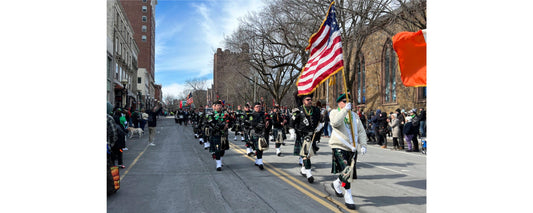“What country, friends, is this?” asks the shipwrecked Viola in William Shakespeare’s Twelfth Night.
“This is Illyria, lady,” the ship’s captain tells her.
If, unlike Viola, you’ve seen Illyria onstage before, don’t imagine you know it. Yale Repertory Theatre’s is a delightful new world, brilliant with color and rhythm and the spirit of Shakespearean comedy—translated for our own time more successfully than in any production I can recall.
sponsored by
Recalibrating Shakespeare’s plays into a different time and place, as this production does, often results in a provocative but spotty offering that works on some levels and fails on others. Director Carl Cofield has no such problem with his Afrofuturist take on Illyria and its virtual reality visions, light sabers, hip hop-inspired fashion and R&B settings of Shakespeare’s songs. The result is both fresh and faithful, serving up to a 21st-century audience the level of delight 17th-century audiences might have experienced at the Globe. Someone sitting behind me inside the University Theatre, where this Yale Rep production is staging, commented during intermission, “This is going to cause me to revisit Shakespeare.”
The evening begins with the theater bathed in watery blue light—a virtual submersion for the audience just as, before the action, Viola and her twin brother, Sebastian, are thrown from their ship into the sea, losing sight of one another and presuming one another drowned. When the drama begins, we’re mostly in the palace of Orsino, Duke of Illyria, and the nearby lavish home of Olivia, the woman he desires, but the set, designed by Riw Rakkulchon, also suggests a not-quite-landed world. Everything happens beneath a ribbed ceiling, curved like the hull of a ship. The immersion is complete.
The production really finds its groove in Scene 3, when the ensemble of Sir Toby Belch (Chivas Michael), Sir Andrew Aguecheek (Abubakr Ali) and Maria (Ilia Isorelýs Paulino) take the stage. Along with Erron Crawford as Feste the clown, who joins them two scenes later, they breathe fresh life into centuries-old comic roles that don’t always land with modern audiences. Their precise timing and 21st-century speech patterns and gestures elicited belly laughs from an audience hearing old language in new ways that made it genuinely funny again. Fart jokes work in pretty much any century, but even the hard-to-explain practical joke these clowns play—tricking Olivia’s dour steward, Malvolio (Allen Gilmore), into dressing in yellow, cross-gartered stockings—plays as well here as if we were still wearing them. As the comedic foil, Gilmore carries off his challenging role beautifully.
Like many of Shakespeare’s comedies, Twelfth Night includes disguises, misunderstandings and mistaken lovers. Viola (Moses Ingram) disguises herself as a man named Cesario in order to land a position in Orsino’s court, where she promptly falls in love with him. He has eyes only for Olivia, who in turn has the misfortune to fall in love with Viola in disguise. When Viola’s twin Sebastian (Jakeem Dante Powell) turns up, looking an awful lot like Cesario, the plot thickens.
The first passing appearance of the regal Olivia (Tiffany Denise Hobbs) in one of the many gorgeous costumes designed by Mika H. Eubanks elicited sighs of approval from the audience, and Hobbs continued to command the stage in successive scenes with her striking, confident presence. It’s easy to understand both what Orsino (William DeMeritt) sees in her and also why he is never going to win her. As the equally headstrong and independent Viola, Ingram carries the audience effortlessly from one scene to another, from Orsino’s palace to Olivia’s garden and back again, serving as our guide through this strange and wonderful tale.
The program dedicates four pages to the history of Afrocentric Shakespearean productions and some of the thematic elements that float to the surface in this one. When the curtain falls, this Twelfth Night isn’t over; there’s a rich set of questions to dive into. “There is no neutral Shakespeare,” the program insists. “Carl Cofield’s Afrocentric take on Illyria does not add a layer on top of the text of Twelfth Night so much as dig into the play with a particular—and stated—set of questions. What can an Illyria that centers members of the African diaspora and their descendants unearth?”
Perhaps that’s why this production succeeds. It’s not slicking the surface of Shakespeare with period costumes or contrived new settings. From start to finish, its Afrofuturist focus makes for a production both thrilling and deep. It’s particularly exciting to see it brought to New Haven high school students through the WILL POWER! educational initiative.
In the play’s final scene, Malvolio the killjoy (Allen Gilmore), who has attempted to reach beyond his station with his own ill-fated desire for Olivia, trips on his way offstage. It’s a tricky moment, but the other characters exhibit the appropriate mix of amusement and remorse, carrying us through it with ease. The scripted misstep is the only one in this production. Under Cofield’s direction, comic timing is elegant, pacing is swift (two and a quarter hours flew by) and the enchantment is complete.
Twelfth Night
University Theatre – 222 York St, New Haven (map)
Showtimes through April 6
(203) 432-1234
www.yalerep.org/…
Written by Kathy Leonard Czepiel. Images photographed by Joan Marcus for Yale Repertory Theatre.








